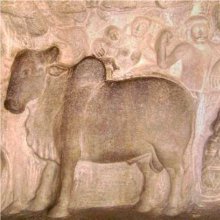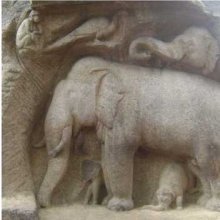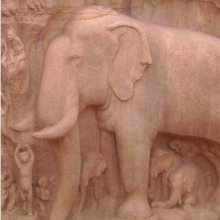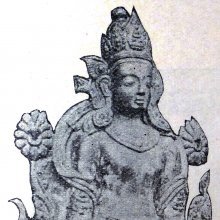Family: 3 definitions
Introduction:
Family means something in Hinduism, Sanskrit, Jainism, Prakrit, the history of ancient India. If you want to know the exact meaning, history, etymology or English translation of this term then check out the descriptions on this page. Add your comment or reference to a book if you want to contribute to this summary article.
Images (photo gallery)
(+133 more images available)
In Hinduism
Shaktism (Shakta philosophy)
Source: Google Books: ManthanabhairavatantramFamily (in Sanskrit, kula) designates both “a group of deities” and “a group of Kaula practitioners”.—Kula literally means ‘family’ which is both the ‘family’ or group of deities headed by the main deity of a Kula, who is its ‘leader’ (kulanāyikā or kulanāyaka) and the ‘family’ of Kaula practitioners, headed and led by their teacher. The teacher is the head of the spiritual family he has made by accepting and initiating disciples. The responsibility he assumes and his oneness with the Kula is such that the Kashmiri teachers maintained that the teacher could not attain liberation until all the members of his Kula were freed.

Shakta (शाक्त, śākta) or Shaktism (śāktism) represents a tradition of Hinduism where the Goddess (Devi) is revered and worshipped. Shakta literature includes a range of scriptures, including various Agamas and Tantras, although its roots may be traced back to the Vedas.
In Jainism
General definition (in Jainism)
Source: The University of Sydney: A study of the Twelve ReflectionsFamily cannot stop the soul going at the moment of death, as discussed in Bhūdhardās’s composition dealing with the twelve reflections (bhāvanā or anuprekṣā), also found in the Tattvārtha-sūtra.—Accordingly, “[all things are impermanent]—King, prince or emperor, an elephant’s mahout: everyone dies someday each at his own time. (1) [there is no shelter] Powerful friends, a goddess or a god, mother, father, family: they can do nothing to stop the soul going at the moment of death. (2) [cycle of rebirth] So poor you cannot meet the cost, you suffer. You are entranced by the desire for wealth. Nowhere in saṃsāra will you find happiness no matter where you look in the world. (3) [...]”.

Jainism is an Indian religion of Dharma whose doctrine revolves around harmlessness (ahimsa) towards every living being. The two major branches (Digambara and Svetambara) of Jainism stimulate self-control (or, shramana, ‘self-reliance’) and spiritual development through a path of peace for the soul to progess to the ultimate goal.
India history and geography
Source: Singhi Jain Series: Ratnaprabha-suri’s Kuvalayamala-katha (history)Family was commonly depicted on the Saṃsāracakra paintings (representing scenes of human life), in ancient India, as mentioned in the Kathās (narrative poems) such as Uddyotanasūri in his 8th-century Kuvalayamālā (a Prakrit Campū, similar to Kāvya poetry).—Page 185.21 f.: Here follows a description of a printed scroll illustrating the Jaina conception of saṃsāracakra. [...] The saṃsāra-cakra illustrated the three worlds of hell, human world and the world of gods. [For example:] An old man surrounded by his family; a beggar asking for food; a mendicant clothed in tattered garments.

The history of India traces the identification of countries, villages, towns and other regions of India, as well as mythology, zoology, royal dynasties, rulers, tribes, local festivities and traditions and regional languages. Ancient India enjoyed religious freedom and encourages the path of Dharma, a concept common to Buddhism, Hinduism, and Jainism.
See also (Relevant definitions)
Starts with: Family cashew, Family priest.
Ends with: High family, Passing-from Noble Family.
Full-text (+36555): Kula, Kutumba, Kulasamkhya, Kulacarya, Abhijana, Kulatilaka, Vamshya, Gotra, Kuladharma, Kautumbika, Vamsha, Khumavara, Parivara, Kulabhrashta, Paraloka, Shankhini, Kulakshaya, Brahmanakula, Kshatriyakula, Nishkula.
Relevant text
Search found 435 books and stories containing Family; (plurals include: Families). You can also click to the full overview containing English textual excerpts. Below are direct links for the most relevant articles:
Vinaya Pitaka (2): Bhikkhuni-vibhanga (the analysis of Nun’ rules) (by I. B. Horner)
Manusmriti with the Commentary of Medhatithi (by Ganganatha Jha)
Verse 3.6 < [Section III - Marriageable Girls]
Verse 3.7 < [Section III - Marriageable Girls]
Verse 8.46 < [Section XI - General Rules regarding Judicial Proceedings]
Vinaya Pitaka (1): Bhikkhu-vibhanga (the analysis of Monks’ rules) (by I. B. Horner)
The Great Chariot (by Longchenpa)
1d.3) The particulars of the Sangha jewel < [Part 1 - The causal refuge]
Part 4a.1 - Meditation on the protection circles < [B. The explanation of meditation practice, together with its action of ripening and freeing]
Part 3e.2a - The self-existing nirmanakaya < [B. The explanation of the kayas and wisdoms]
Guhyagarbha Tantra (with Commentary) (by Gyurme Dorje)
Text 11.19 (Commentary) < [Chapter 11 (Text and Commentary)]
Text 7.14 (Commentary) < [Chapter 7 (text and commentary)]
Text 21.1 (Commentary) < [Chapter 21 (Text And Commentary)]
Nitiprakasika (Critical Analysis) (by S. Anusha)
Soldier Welfare Measures < [Chapter 5]
Commentary of the Nītiprakāśikā < [Chapter 2]
War Ethics (dharmayuddha) < [Chapter 5]
Related products
(+19 more products available)











